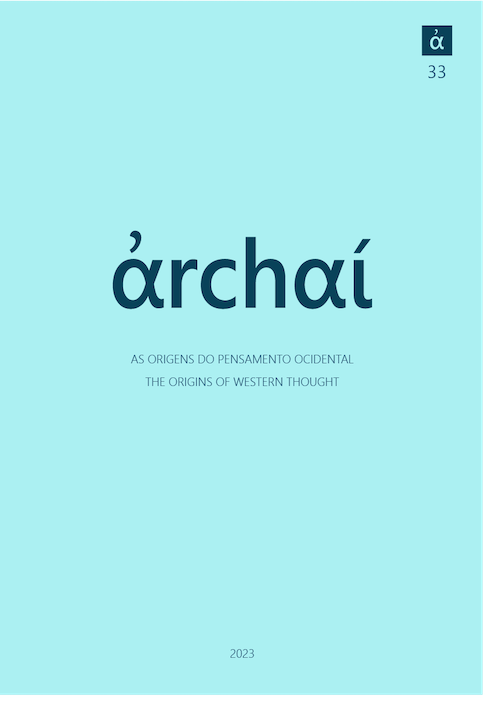Aristotle. Prior Analytics 1.1-7. Introduction and translation
DOI:
https://doi.org/10.14195/1984-249X_33_31Keywords:
Aristotle, Prior Analytics, syllogism, translationAbstract
Translation of the initial chapters of Aristotle’s Prior Analytics into Portuguese and introduction, which addresses interpretative disagreements and translation choices.
Downloads
References
ACKRILL, J. (1963). Aristotle. Categories and De Interpretatione (translated with notes and glossary). Oxford, Clarendon Press.
ANGIONI, L. (no prelo). Aristotle on “dunatos” as a label for imperfect syllogisms. In: CRIMI, M. and CIOLA, G. (eds.). Validity Throughout History Munich, Philosophia Verlag.
BARNES, J. (1993). Aristotle. Posterior Analytics (translated with a commentary). 2nd ed. Oxford, Clarendon Press. Clarendon Aristotle Series.
BOCHEŃSKI, I. M. (1968). Historia de la Lógica Formal Madrid, Editorial Gredos. Edición Española de Millán Bravo Lozano.
CASTAGNOLI, L. (2016). Aristotle on the Non-Cause Fallacy. History and Philosophy of Logic 37, n. 1, p. 9-32.
CHARLES, D. ; CRIVELLI, P. (2011). ‘PROTASIS’ in Aristotle’s Prior Analytics. Phronesis 56, p. 193-203.
CRAGER, A. D. (2015). Meta-Logic in Aristotle’s Epistemology Dissertation. Princeton University.
CRUBELLIER, M. (2011). Du Sullogismos au Syllogisme. Revue Philosophique de la France et de l'Étranger 201, n. 1 (L’Organon d’Aristote), p. 17-36.
CRUBELLIER, M. (2014). Aristote. Premiers Analytiques (traduction, introduction, notes, commentaire et bibliographie). Paris, GF Flamarion.
CORCORAN, J. (1974). Aristotle’s Natural Deduction System. In: CORCORAN, J. (ed.) Ancient Logic and its Modern Interpretation Dordrecht/Boston, D. Reidel Publishing Company, p. 85-131.
DUTILH NOVAES, C. (2011). The Different Ways in which Logic is (said to be) Formal? History and Philosophy of Logic 32, n. 4, p. 303-332.
EINARSON, B. (1936). On Certain Mathematical Terms in Aristotle's Logic. Part II. The American Journal of Philology 57, n. 2, p. 151-172.
FERREIRA, M. (2020). “Συλλογισμός” tem dois significados nos Analíticos?. Dissertatio 52, p. 59-89.
GOMES, P. (1986). Aristóteles. Organon (III. Analíticos Anteriores) Lisboa, Guimarães Editores.
IWATA, N. (2021). Aristotle on Geometrical Potentialities. Journal of the History of Philosophy 59, n. 3, p. 371-397.
KNEALE, W.; KNEALE, M. (1962). The Development of Logic Oxford, Clarendon Press.
KRETZMANN, N. William of Sherwood’s Introduction to Logic (translation, introduction and notes). Minneapolis, University of Minnesota Press, 1966.
LEAR, J. (1980). Aristotle and Logical Theory Cambridge, Cambridge University Press.
LESHER, J. H. (2010). Saphêneia in Aristotle:‘Clarity’, ‘Precision’, and ‘Knowledge’. Apeiron 43, n. 4, p. 143-156.
ŁUKASIEWICZ, J. (1957). Aristotle’s Syllogistic from the standpoint of modern Formal Logic Oxford, Clarendon Press.
MALINK, M. (2008). TWN vs. TWI in Prior Analytics I.1-22. Classical Quarterly 58, n. 2, p. 519-536.
MALINK, M. (2009). A Non-Extensional Notion of Conversion in the Organon. Oxford Studies in Ancient Philosophy XXXVII, p. 105-141.
MALINK, M. (2014). Deduction in Sophistici Elenchi 6. In: LEE, M.K. (ed.) Strategies of Argument: Essays in Ancient Ethics, Epistemology and Logic Oxford, Oxford University Press, p. 149-174.
MALINK, M. (2015). The Beginnings of Formal Logic: Deduction in Aristotle’s Topics vs. Prior Analytics. Phronesis 60, p. 267-309.
MALINK, M. (2017). Aristotle on Principles as Elements. Oxford Studies in Ancient Philosophy 53, p. 163-213.
MIGNE, J-P. (1847). Manlii Severini Boetii Opera Omnia Paris, J.-P. Migne.
MIGNUCCI, M. (1988). Aristotele. Gli Analitici Primi (traduzione, introduzione e commento). Napoli, Luigi Loffredo Editore.
MIGNUCCI, M. (2020). Syllogism and Deduction in Aristotle’s logic. In: FALCON, A.; GIARETTA, P. (eds.). Ancient Logic, Language, and Metaphysics: selected essays by Mario Mignucci. London ; New York, Routledge, p. 3-19.
MORISON, B. (2012). What was Aristotle’s Concept of Logical Form? In: MORISON, B.; IERODIAKONU, K. (eds.). Episteme, etc.: Essays in Honour of Jonathan Barnes Oxford, Oxford University Press , p. 172-188.
MORISON, B. (2015). What is a Perfect Syllogism? In: INWOOD, B. (ed.). Oxford Studies in Ancient Philosophy XLVIII, p. 107-166.
PATZIG, G. (1968). Aristotle’s Theory of the Syllogism: a logico-philological study of Book A of the Prior Analytics Translated from the German By Jonathan Barnes. Dordrecht, D. Reider Publishing Company.
ROSS, D. W. (1949). Aristotle's Prior and Posterior Analytics (a revised text with introduction and commentary). Oxford, Clarendon Press.
SAINSBURY, M. (2020). Varieties of Logical Form. Disputatio 12, n. 58, p. 223-250.
SALMON, W. (1973). Logic Englewood Cliffs, Prentice-Hall.
SANMARTÍN, M. C. (1988). Aristóteles. Tratados de Lógica (Órganon) II (introducciones, traducciones y notas). Madrid, Gredos Editorial.
SMITH, R. (1989). Aristotle. Prior Analytics (translated with introduction, notes and commentary). Indianapolis;Cambridge, Hackett Pub. Co.
STEINKRÜGER, P. (2015). Aristotle’s assertoric syllogistic and modern relevance logic. Synthese 192, p. 1413-1444.
STRIKER, G. (2009). Aristotle. Prior Analytics, Book I (translated with an introduction and commentary). Oxford, Clarendon Press.
WAITZ, T. (1844). Aristotelis Organon Graece (novis codicum auxiliis adiutus recognovit, scholiis ineditis et commentario instruxit) Lipsiae, Sumpitbus Hahnii.
WILLIAMS, M. F. (1984). Studies in the Manuscript Tradition of Aristotle’s Analytica Königstein, Verlag Anton Hain.
Downloads
Published
How to Cite
Issue
Section
License
Copyright (c) 2023 Wellington Damasceno de Almeida, Mateus R. F. Ferreira

This work is licensed under a Creative Commons Attribution 4.0 International License.
Given the public access policy of the journal, the use of the published texts is free, with the obligation of recognizing the original authorship and the first publication in this journal. The authors of the published contributions are entirely and exclusively responsible for their contents.
1. The authors authorize the publication of the article in this journal.
2. The authors guarantee that the contribution is original, and take full responsibility for its content in case of impugnation by third parties.
3. The authors guarantee that the contribution is not under evaluation in another journal.
4. The authors keep the copyright and convey to the journal the right of first publication, the work being licensed under a Creative Commons Attribution License-BY.
5. The authors are allowed and stimulated to publicize and distribute their work on-line after the publication in the journal.
6. The authors of the approved works authorize the journal to distribute their content, after publication, for reproduction in content indexes, virtual libraries and similars.
7. The editors reserve the right to make adjustments to the text and to adequate the article to the editorial rules of the journal.



